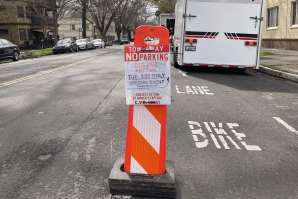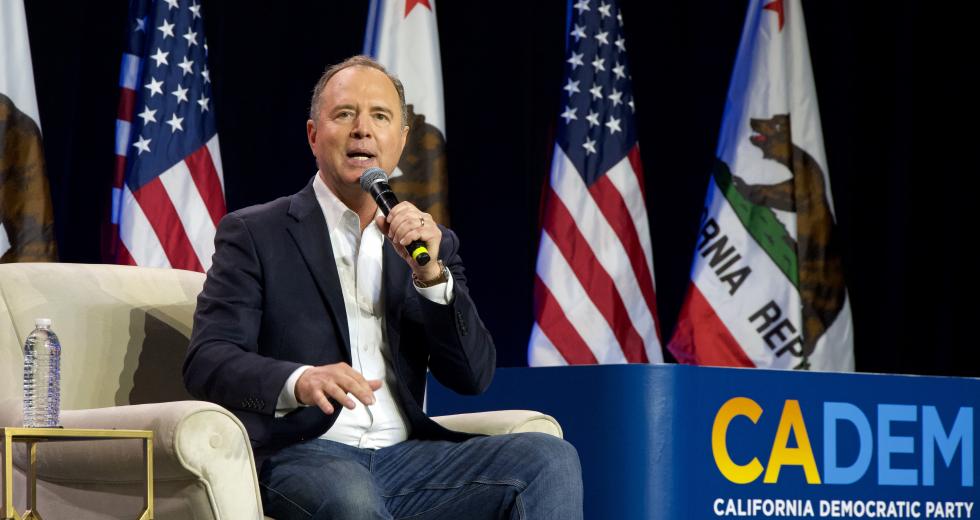When long-serving Senator Dianne Feinstein died last year, Gov. Gavin Newsom appointed union organizer and EMILYs List President Laphonza Butler as an interim senator to serve out Feinstein’s term. Butler subsequently announced that she would not throw her hat into the primary ring that would determine who would serve in the U.S. Senate after that interim term ended. Her withdrawal left as leading candidates three Democratic hopefuls in contention, the Congress members Adam Schiff, Katie Porter, who are both from Southern California, and Oakland’s Barbara Lee, as well as the Republican former baseball star Steve Garvey.
On March 5, California voters will go to the polls, not just in the presidential primaries, but also in primary elections that will winnow down to two the number of those U.S. Senate hopefuls who will progress to the November general election.
Latest polling shows Schiff, who is backed by many of California’s political heavyweights, including ex-House Speaker Nancy Pelosi and who built his national profile during the two Donald Trump impeachment hearings, with 28 percent; ahead of both Porter at 16 percent and Lee at 9 percent.
The wildcard in this race is Steve Garvey, a longtime Los Angeles Dodger in the late 1960s and 1970s, who finished his baseball career with the San Diego Padres. Garvey is running as a Republican, and in some recent polls has edged into second place, with 22 percent of the vote.
Schiff has been focusing on Garvey in recent ads, ostensibly to call him out as being too rightwing for California voters — but, in practice, to boost his visibility among conservatives, so as to help him place second in the open primary, which would send him on to a runoff against Schiff in November. That is, observers note, Schiff’s dream outcome, since he would prefer to run against a Republican in the November general election than against a fellow Democrat — Porter, in particular, has a fiercely loyal grassroots following, and would likely build steam as the general election approached.
Schiff’s ads on Garvey are a dirty trick — but not an uncommon one given the peculiarities of California’s open primary system, where Democrats and Republicans compete against each other in the primary and only the top two proceed to the final round of the election.
Porter has called Schiff’s ploy “brazenly cynical.” Yet, she also hasn’t been above similar actions. In the homestretch to the primary, her campaign has devoted large amounts of money to running ads that label another Republican, Eric Early, as too conservative — thus hoping to also raise his profile and divide the GOP vote enough in the open primary that Porter can make it through in second place.
Not surprisingly, given the size of California’s electorate and its media markets, it’s an expensive race: To date, more than $26 million has been spent by the candidates’ campaigns and outside groups, with more money pouring in by the day.
Despite the ferocity of this race, however, on many issues the three Democrats agree: All have criticized Biden’s recent tougher posture on the border; they all believe Trump and the MAGA movement are existential threats to American democracy; they support more investments in green energy infrastructure; they oppose restrictions on abortion rights; they favor protecting LGBTQ+ rights, and so on.
But there are differences amongst the Democrats as well:
Lee, who has a storied reputation as one of the most progressive members of Congress, has called for a 50 percent cut to CBP budget, and has labelled ICE “rotten to the core.” She has also called for a permanent ceasefire in Gaza, a move her two Democratic opponents have shied away from.
Porter has called for an end to the Senate filibuster, used by minorities in the senate to block legislation.
By contrast, Garvey’s politics are considerably to the right of where all the three Democrats are. He has pitched his campaign as being against tax increases, against additional government regulations, and in favor of rolling back regulations that impede the speedy construction of new housing in California. He also wants an audit on how California spends its billions of dollars tackling homelessness.
Despite Schiff’s ads, however, Garvey certainly isn’t pitching himself as a MAGA candidate. On the debate stage with his opponents, Garvey, who has pitched himself as a commonsense moderate, has refused to say whether or not he’ll support Donald Trump for president — though he is on record as having voted for him in both 2016 and 2020. His website states that he supports securing the border but also respects “the dignity and aspirations of those who come here seeking a better life,” and that he wants to see “practical pathways to citizenship” for immigrants in the U.S. — a very different rhetoric from that emanating out of the Trump camp. Unlike many Republicans in Congress, Garvey has also expressed strong support for Ukraine, and his website acknowledges the reality of climate change and its impact on Californians.
California is in for a long and expensive Senate race this year. Next week’s primary will determine whether two Democrats make it to the general election or whether it’s a more traditional Democrat-Republican play-off. Either way, it’s a fair bet that between now and November tens of millions of dollars will be spent fighting the most expensive Senate contest in the country.
Stay up to date on business in the Capital Region: Subscribe to the Comstock’s newsletter today.
Recommended For You

Lights, Camera, Sacto
Warner Bros. movie starring Leonardo DiCaprio highlights Sacramento as filming location
With Sacramento nearly 400 miles from Hollywood and an increasing number of films shot in Georgia for tax purposes, the Capital Region doesn’t frequently host productions. But when it happens, people can get excited.

Truly, Forever Goldrush
Popular Sacramento bar band releases first album in 11 years
Harkening back to a childhood raising hell in small towns in the foothills of Amador County, Forever Goldrush begins to play “Dirt Road Kids” from the band’s 2012 album release “Chambers,” elevating the vibe within the small KSSU radio studio.

A Decade of Dazzle
Sacramento burlesque troupe The Darling Clementines celebrates 10 years of body positivity and inclusion
In November, Sacramento burlesque troupe The Darling Clementines celebrated its 10-year anniversary. To celebrate, it held a blockbuster show with visiting acts like Frankie Fictitious and Banbury Cross, both from the Bay Area.

The Other J. Gregory
A late banker shares a name with a Sacramento Zoo rhinoceros. Coincidence?
Jan Gregory, a banker, passed away in May in Sacramento. Five days later, the front page of the Sacramento Bee announced that the Sacramento Zoo had acquired a rare white rhinoceros named J. Gregory.

Restaurants Are Hanging Up on the House Phone
How the pandemic and rising costs led to the ‘phoneless restaurant’
This may have happened to you: You call a restaurant, and instead of a live person, you get a recorded voice telling you to leave a message and someone will get back to you. Or even worse, you go online looking for a restaurant’s phone number, only to discover there isn’t one.



